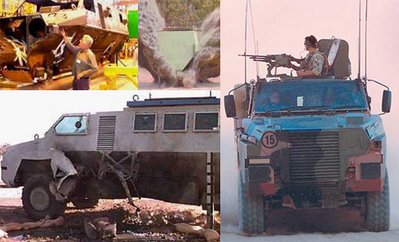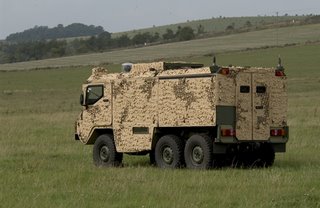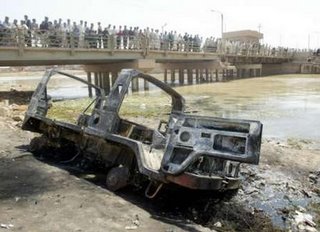
I promised to respond to Gerald Howarth's e-mail, which we published on the blog
yesterday. The exercise is useful and valid, not least because Gerald, as shadow minister for defence, is a senior Tory politician and his views give a remarkable insight into the mindset. So, here goes.
From the outset, it must be said of the man that it must take a real in-depth understanding of the political process in order to send an e-mail in which you have insulted the co-editor of one of the leading British political blogs, and then give the recipient
carte blanche to circulate it. Not that I have any problem about being insulted in such a way as clearly, in Gerald, we have a master at work, and we can only stand back and admire his political skills.
Actually, that is a bullshit, clever-dick response which is not true. I wrote it in the first draft of this piece, but I have left it up as an example of the line I could have taken – jokey and sardonic. But I mind very much indeed being slagged off by this low-grade example of a politician who cannot even be bothered to get his facts right.

Yes, we know he launched my
pamphlet on Galileo at the House of Commons, as he is prone to tell everyone at every opportunity, and we acknowledged this fulsomely. From
July 2004, when he hosted the launch, through to
November of that year, we mentioned Gerald no less than five times on the blog, each time in glowing terms. During that period, he also enjoyed two favourable mentions in the Booker Column.
But, declares Gerald, "Richard North has some good ideas but gives no credit to anything anyone else does". Well, we gave him ample credit for his action on Galileo and much else. In all, this blog has made 32 mentions of Gerald Howarth (not including this one), most of them favourable, right up to
May 2006 when, in a general commentary about defence issues and MPs' involvement, we noted:
It has been left largely to the likes of shadow procurement minister Gerald Howarth and back-bencher Ann Winterton to make the running. Admirable though their efforts have been, they have not been enough, without the support of the wider House.

However, there was another aspect to the way the blog treated Gerald. We have been known, on occasions, to be pretty vicious about some of our subjects, but until recently, Gerald got off exceptionally lightly. For instance, we found it extremely difficult to keep quiet in April 2005 when the government announced an order for over £1 billion-worth of
MAN-Nutzfahrzeuge trucks for the Army. This was an order which went to the German firm despite the trucks not meeting "defence planning assumptions" and the home-built vehicles being better, but did Gerald Howarth complain? Well, not exactly. He complained that the MoD had not bought enough of them.
I really had to bite my tongue on that one – this was and remains a betrayal of the Army, dumping substandard equipment on it, for what were evidently political reasons. And Gerald dropped the ball.
Perhaps he might have been more on the ball if he concentrated on his two jobs – the one as constituency MP and the other running his portfolio as defence procurement shadow. But a man who, by his own admission, is far too busy to read
EU Referendum, manages to find time to do other day jobs, including having worked in the role of "consultant" for a brace of executive jet charter brokers,
Aircraft Zone and
European Business Jets Ltd.
Still, if he really was that busy, he could always have asked his assistant Mike Wood to brief him on the essentials - which would have been one way to get publicity - from
The Independent on Sunday, at least.

Anyhow, the fact that the Tory group has been so bad at projecting it agenda has not stopped Gerald laying the charge that I have "little understanding of the - often extremely frustrating - political process, or of the power of the Opposition to get the media to focus on the issues we are tackling." Leaving aside his observations about my understanding of the political process for the moment, I readily concede that I have not (recently) got myself on the front page of the
Independent on Sunday but who was it that got "Snatch" Land Rovers on the front page of
The Sunday Times, to say nothing of several mentions in the Booker Column?
And so to the substantive part of Gerald's critique.
He starts by claiming that "the Opposition has been doing precisely that - opposing." He adds, "Not mindlessly, but intelligently where we believe the Government is wrong." And right here, we fall out with the man. Even in their
Parliamentary tactics, we see them fail but, even more fundamentally, they fail on any number of key issues.

Take for instance, the issue of the shortage of helicopters, about which the "Opposition" has been voluble. Yet, although the shortage is here and now, in June last we got a government announcement about the
Future Lynx committing the government to a long-term £1 billion project to buy 70 helicopters – averaging £14.2 million each. But, incredibly, they will not be in service until 2014. This was at a time when the Army was down to six Lynx multi-role tactical helicopters in the whole of Iraq and desperately needed (and still needs) more capability.

We had therefore, a situation where the Army was having to wait nearly eight years (longer than the Second World War) for new helicopters. And, while the US Army was paying £3.6 million each for their OH-58D Kiowa Warrior helicopters, we were to pay four times as much. And did we get any complaints from the Opposition? Not a murmur.
The British Army policy on helicopters (largely enforced by a dog-in-the-manger RAF) is insane - the insistence on a single, multi-role aircraft type with the airframe shared with the Navy (combined with an industrial policy of home design and build) means you end up with a camel of an aircraft that is really too expensive for some jobs, too big and heavy for others and not big enough for other roles. In the final analysis, this means you end up with a £14.2 million Rupert taxi which is not big enough to carry a fully-equipped section.
If ever there was something which cried out for full political examination and debate it is this - and this is directly Gerald's responsibility. Yet, as far as I know, he has not asked a single question on the validity of the Future Lynx (even though he hopes it will be his party in government when it comes to paying for the machines). In my view, in addition to a sustained questioning campaign, he should have been pressurising for a Select Committee investigation, forcing the (Conservative) chairman to get off his backside.

Then there was the episode of the
Vipir thermal imagers, the lack of which was causing serious complaints amongst our troops in Afghanistan. Did we get any complaints from the Opposition? Well, the
Lib-Dems intervened. But we heard nothing at all from Gerald Howarth, or any other Conservative.
Take the appalling episode of the four service personnel killed by a bomb while being transported in an unprotected
water taxi, subsequent to which it was established that the passengers were
highly vulnerable, not least because there had been
16 previous attacks. But did Gerald or any other Conservative complain? Once again, silence.

We raised the issue of the unarmoured
WMIK Land Rovers in Afghanistan, leaving our soldiers dangerously exposed, while other national contingents benefited from armoured vehicles, even the
Estonians. Did we hear anything from the Conservatives? Not a thing.
Yet this here is not our only litany of complaint. We set out one
here, remarking on Conservative silence on FRES, on their silence on the government's disastrous record on unmanned aerial vehicles, on Gerald's lacklustre performance over the "Snatch" issue and his promotion of the dangerously inadequate Pinzgauer Vectors.

There was also the continuing issue of the Army's inability to deal with hit-and-run mortar raids. Howarth was more than informed. He was invited to supply this blog with a 1000 word piece setting out the Conservative policy on this and allied issues – with a promise that it would gain a reference in the Booker column. Promise there was but response there was none.
Against all this, and much, much more, Gerald tells us that Liam Fox held a press conference on Tuesday which was extremely well-attended, including by George Jones of the
Telegraph. He then complains that "very little coverage followed, the
Telegraph running not a single column inch."
Yet I set out in
this piece how you, as a minority party, set about getting publicity. The one thing I would not do is waste my time with a press conference. Except on very rare and special occasions, they almost never yield results. Despite that, according to the great Gerald Howarth, I am the one that "has little understanding of the … power of the Opposition to get the media to focus on the issues we are tackling."
If I had been handling the publicity for the Conservatives, over Christmas I would have published
a wish list. If it had been issued in the name of the Party, instead of this blog, the media would still be talking about it and it would be dominating the agenda.
So, we are supposed to be impressed that Liam spelled out forcefully in a series of PowerPoint displays the extent to which the Armed Forces have been betrayed by this Government? Big deal. Where was Liam months ago – where was he on the detail?
And so far out of touch with the debate is Gerald that he asks us to approve of Fox, when asked if he would increase defence resources if he were Secretary of State today, replying emphatically "yes", thus pre-empting the Prime Minister's remarks. Yet, read
The Sunday Telegraph today. Remarkably, Rayment has managed to write something halfway intelligent (it happens occasionally), citing both Maj Gen Julian Thompson, and Col Tim Collins, both agreeing that money must be found from somewhere to upgrade the Armed Forces. But Collins argues that that doesn't mean there is not enough money in defence. “It is just not being spent properly," he says.
We would tend to agree with that. When you have a defence establishment spending £14.2 million each on light attack helicopters, when you can actually buy them – if you are really pushed – for less than £1 million. Throwing money at defence is not the answer. First we have to look at the waste, and the gross overspending.
That sort of makes the rest of Liam's little homilies rather flat and redundant, and it is not surprising that he got little publicity on them. From the sound of it, he had very little of interest to say. But, on
other things said during the press conference, it looks like Liam made a bit of a fool of himself, so much so that he got himself
in a spot of bother.
However, Gerald feels he could "go on and on" giving examples of what we – the team - have been doing, but confined himself to let me give you just three specifics.
He claims he was the first to raise the issue of armoured vehicles. This he did on his return from Iraq in September 2005. He told John Reid privately that he had to do something to get better protection for the troops facing roadside bombs (privately because he represents a garrison town and knows how careless politicians can cause increased anxiety). According to Gerald, Reid said they (the MoD) were aware of the problem and actively seeking solutions, but would not be specific. Since then, he claims, "we have raised the matter repeatedly."

It is true that once pushed, the Conservative team did have an effect, but it took some pushing, without which, doubtless, the Conservatives would have achieved nothing. That apart, Gerald cannot resist a snide little dig about my expertise, on the comparison between the RG-31 and the Mastiff (actually, the Mastiff is far superior in protection afforded) and he preens himself about establishing that only four have been delivered.
As far as the Pinzgauer Vector is concerned, Gerald is more than a little disingenuous. The vehicle is
potentially a killer and has no redeeming features. Yet, while he has given the marque
a puff, at no time has he raised the dangerous vulnerability of this machine with the minister, or at all in parliament.

Gerald's second claim to fame is the problem of troop air transport. The RAF is operating clapped-out 40 year old VC-10s and 35 year old Tristars half of
which, he says, we have just established (through Parliamentary Questions, our principal means of trying to get information) are not fit for purpose. That is as maybe but, in raising the issue with the Telegraph,
he got it wrong.
We can give him the third issue – the procurement failure of the Landing Ships Docks project, and the appalling management by the MoD. But, in terms of the immediate concerns for our troops in Iraq and Afghanistan, the issue is an irrelevance. One commends the work, but not the sense of priorities.

However, says Gerald, the brutal truth is that we are not in power and not responsible for today's calamitous defence policy. But there he is also being more than a little disingenuous. Which government ordered the Eurofighter? Which government ordered the Storm Shadow – the "
million pound bomb"? Which government ordered the EH 101, now called the Merlin, and under whose watch was the disaster that is the Type 45 Destroyer first set in train? Much of the current procurement budget, you will find, is dominated by decisions which were made by previous Conservative governments.

Thus while, say, one would like the opposition to oppose the continued purchase of the Eurofighter, Gerald is not only in favour of it, he is also hopelessly compromised and, therefore, silent. Not from him, therefore, would you get calls for the purchase of, say, a number of AC-130s. In fact, not ever can I recall any Conservative politician coming up with ideas for new kit that had not already been suggested by someone else. And not ever has Gerald pointed out the amount of money wasted on
European projects. He simply does not agree that our defence priorities have been distorted by pursuing a European agenda.
Therefore, he tries to ignore the issue and, instead, tells us that the Tories understand the challenges which face our Armed forces and are incomparably best placed to meet them. He claims 14 MPs and Lords with military experience of one sort or another. But, what have they done? The list of the things they have not addressed is endless.
So, coming to a conclusion, Gerald tells us that the team will not always get it right and must be subject to criticism if we get it wrong. But, when he gets criticism, he either ignores it or, as in this case, rejects it outright – not conceding one single element of error. Where, from the torrent of material produced by this blog, has Gerald actually admitted – even once, on one issue, that his fabulous team got it wrong or could have done better?
Yet goodwill he wants. But where is the reciprocation Gerald, the famous
quid pro quo? You actually had a great deal of support from us – more than you deserved. You frittered it away, you ignored us, behind the scenes you briefed against us and now, publicly you deride and insult me. And you want goodwill to support and encourage you?
Thus you tell us that the most disastrous outcome would be for the UK to have inflicted on it a Labour Government led by a dour Scottish redistributive socialist who has consistently starved the Armed Forces of the resources they need to do the job and who until recently has distinguished himself by his complete lack of interest in our servicemen and women. That outcome, you say, will be assured unless people get behind the Tory party and rally to our flag.
We have
answered you on that. But the odds are, you will not read our answer and, in the unlikely event that you do, you will not accept what we say and act on it. And because of that, Gerald Howarth MP, Member of Parliament for Aldershot & Shadow Defence Minister, you will be a loser.
COMMENT THREAD

 On the other hand, yesterday, there was an inquest into the deaths of three soldiers - Pte Phillip Hewett (pictured), 2nd Lt Richard Shearer and Pte Leon Spicer. These were the three soldiers from the Staffordshire Regiment who were killed in Al Amarah, Iraq on 16 July 2005 by a roadside bomb while riding in a lightly armoured "Snatch" Land Rover.
On the other hand, yesterday, there was an inquest into the deaths of three soldiers - Pte Phillip Hewett (pictured), 2nd Lt Richard Shearer and Pte Leon Spicer. These were the three soldiers from the Staffordshire Regiment who were killed in Al Amarah, Iraq on 16 July 2005 by a roadside bomb while riding in a lightly armoured "Snatch" Land Rover. Furthermore, although the MoD promised that there would be an "effective capacity" of the Mastiff mine and blast-protected vehicle in Iraq by the end of last year. So far, only four have so far arrived and it will be next month before there are just 20 in place.
Furthermore, although the MoD promised that there would be an "effective capacity" of the Mastiff mine and blast-protected vehicle in Iraq by the end of last year. So far, only four have so far arrived and it will be next month before there are just 20 in place. Nevertheless, by the early evening there had been only one media report on the verdict, on the BBC's Stoke and Staffordshire local television news. The national television and radio news did not even mention it and, in the national dailies, it got one brief "meanwhile…" in the Daily Mirror attached to the tail end of another inquest report on the "friendly fire" incident involving A-10s.
Nevertheless, by the early evening there had been only one media report on the verdict, on the BBC's Stoke and Staffordshire local television news. The national television and radio news did not even mention it and, in the national dailies, it got one brief "meanwhile…" in the Daily Mirror attached to the tail end of another inquest report on the "friendly fire" incident involving A-10s.  We have, of course, covered the vulnerability of the "Snatch" Land Rovers extensively on this blog. Then, immediately prior to the Coroner's finding, there were two media reports, one in The Telegraph, yesterday morning, and one at the weekend in the Observer.
We have, of course, covered the vulnerability of the "Snatch" Land Rovers extensively on this blog. Then, immediately prior to the Coroner's finding, there were two media reports, one in The Telegraph, yesterday morning, and one at the weekend in the Observer.











































